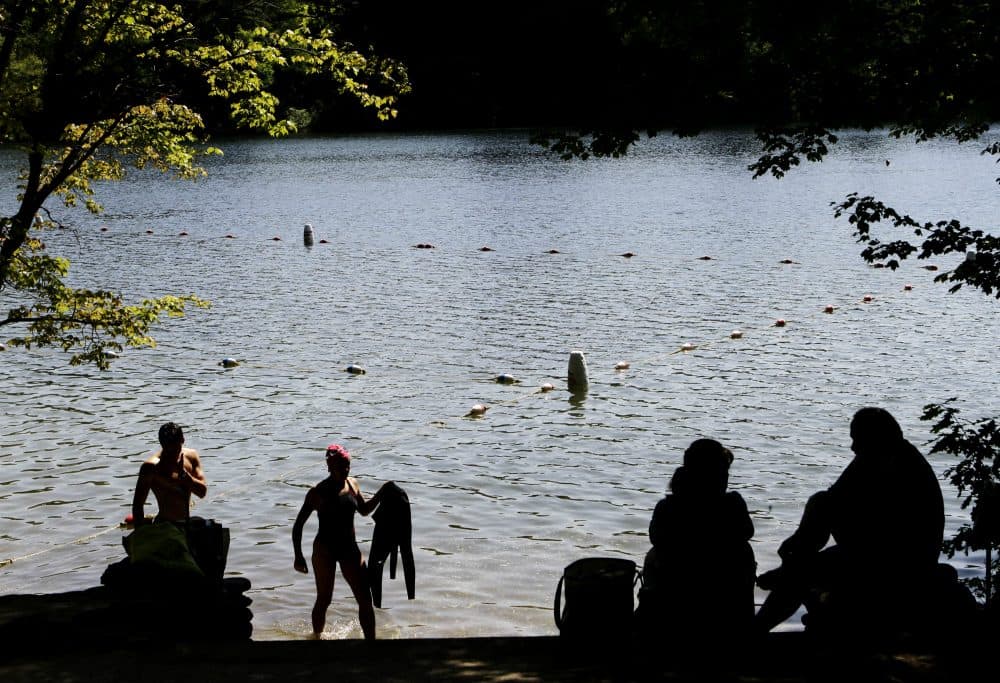Advertisement
Rediscovering Our Shared Humanity: New Lessons From Walden Pond

To celebrate my birthday, I take a vacation day from work and head out to Walden Pond before the parking lot closes. It is the hottest day of the year, and by 10:30 a.m., the beach is already dense with strollers, umbrellas, small tents and sticky bodies of all ages.
Out near the farthest buoy line, an overweight tattooed man with a shaven head and big bristling beard is cavorting with his wife, also large and adorned with inky pictures of eagles and lightning. He pulls her toward him, she splashes him lightly and pushes him over, and he provides a running football broadcaster’s narration of their frolic. Their kids are tossing a ball nearby, their son making diving catches in the water. They are buoyant; they jostle and bounce, freed from the greedy pull of gravity. They look like Hell’s Angels or Idaho militia members, like the couples you see in news photos of American flag-draped Trump supporters or Second Amendment defenders.
Of course these are caricatures; I know nothing about these people except that they have an outlaw fashion aesthetic. But I also know that regardless of what they think about firearms or candidates, whether they appreciate diversity or want to take “their” country back by any means necessary, right now they are simply enjoying the blessing of cool clear water on a blistering day. As their leaping son practically knocks over a small Indian girl nearby, the woman quickly apologizes to the child’s mother and father, and the man chastises his boy. In heavily accented, lilting speech, the Indian parents assure them that no harm’s been done, that their daughter is startled but not hurt, and the four parents smile wryly at each other, united in the challenge of keeping their children both lively and safe.
I swim away, out to the middle of the pond. Looking back on this, my birthday, I’m angry that in my lifetime, not enough has changed.
Maybe the white parents are celebrity chefs or software engineers, though I doubt it. But even if they are true to the stereotype I’ve assigned to them — even if they are struggling to make ends meet, feeling angry and disenfranchised and blaming exactly the wrong people for their hardships — today, right now, they are just grown-ups enjoying simple, childish pleasures. Except for the handful of triathletes in wet suits grimly trying to improve their mile times, so are all of us dunking, paddling, floating mammals here today. In this instant, I can’t imagine that they are thinking about banning immigrants or protecting the right to own automatic weapons or denying the fact of climate change. No, in this sun-baked, water-splashed moment if I were to ask them why they held those beliefs and why those convictions were so important, I think that they would look at me in blank puzzlement, unable to remember why they’re so aggrieved. But ask them tonight, when they’re back in their overpriced rental or heavily mortgaged saltbox house, and they’ll once again channel the vitriol that’s been scripted for them.
I swim away, out to the middle of the pond. Looking back on this, my birthday, I’m angry that in my lifetime, not enough has changed. The poor are poorer, the exiled are finding no safe haven, and the ruling class is still all too successful at pitting the have-nots against one another. But looking ahead, I’m not quite despairing, and find a strange hope in the riot of colors dotting the shoreline. Thermoses, beach umbrellas, insulated baskets, backpacks, kayaks, brightly packaged tubes and bottles of sunscreen — these are the human inventions that enable us to be mobile, to protect ourselves and our children while adapting to a rapidly changing environment. They are the mundane but profoundly practical products of imagination and skill that people centuries from now will dig up in deserts that once were lakes.
And all of them were created by the people who populate the pond, the people without summer homes, who rediscover their shared humanity on days like this.
